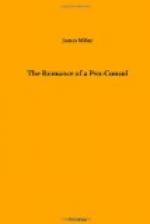‘Some people,’ Sir George made comment, ’declared it absurd that I should instil those ideas into the minds of the natives, but, in reality, it resulted in their having far more respect and regard for the Queen.’ Assuredly, his policy made the Kaffirs eager to get land titles, and these were always another link binding them to good behaviour. It was the contrivance of the silken thread, wound here, there, everywhere, as against the other method, of a horse-hair halter.
Should some swashbuckler have contrary views on native administration, he could relieve his fierceness by tracing the word ‘Hottentot’ to its origin. Sir George had an amusing story of Cape Town in controversy on this term, which the Hottentots had always insisted did not belong to their forefathers.
‘With a desire to solve the problem,’ he related, ’I suggested that people in Cape Town should be asked to write papers on the name. This proposal was carried out, and a small sheaf of essays came in response. Well, I was looking over an old Dutch dictionary, and there I found “Hottentot” described as meaning “Not speaking well; a stammerer.” The name, apparently, had been conferred by the early Dutch settlers, in South Africa, upon the natives first met, on account of the stuttering noise these caused in speaking. All the competitors wanted to have their papers back, in order, as they pleaded, to make a few corrections.’
Again, that was a process which Sir George was ever willing to apply to himself. Yet, being very human, he loved to make the corrections in his own fashion, like the essay-writers at Cape Town. There, at the foot of Africa, he sat, bold and cautious, leading the What-Was onward to the What-Ought-To-Be. He might be compared to a charioteer driving two horses, one white in two shades, jibbish at a corner, the other black as Satan, unbroken to the bit. But the chariot must move forward steadily, evenly, to its greater glory.
Kaffraria had to be put on a peace footing. The ideas, at the root of the tribal system, were averse to the growth of civilisation, but instead of pruning these violently, and so causing friction, Sir George would adapt them. The chiefs were largely dependent for their wealth in cattle and other chattels, on the punishments which they meted out to the tribesmen for offences, or imaginary offences. Let a Kaffir prosper, and he was certain to be charged with witchcraft. That was sudden death, and the cattle went to the kraals of him who ordered it.
The chiefs had every incentive to create witchcraft cases, thus keeping the land dark. Sir George met that, and farther bonded them fiefs of the Queen, by giving them small salaries as magistrates. He established regular courts, and in these the chiefs had their seats and a white man’s guidance, while the fines went to the Government. A scarred warrior exchanged his dripping assegai for the Queen’s commission as a J.P. He swaggered mightily at his bargain.




